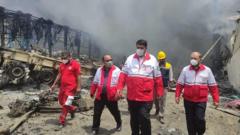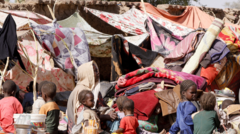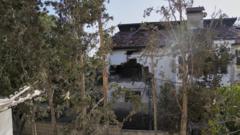As the Israeli blockade stretches, malnutrition rates surge, leaving Gazans reliant on dwindling community support.
**Humanitarian Crisis in Gaza: UN Food Aid Depletes Amid Long-Standing Blockade**

**Humanitarian Crisis in Gaza: UN Food Aid Depletes Amid Long-Standing Blockade**
UN agencies face dire conditions as Gaza's food supplies dwindle due to continued Israeli restrictions.
The UN World Food Programme (WFP) has reported a critical depletion of food aid in Gaza after seven weeks of Israeli-imposed restrictions. The agency has announced that its last remaining food stocks were distributed to community kitchens that provide around one million meals daily. These vital kitchens are expected to run out of food in mere days.
The blockade began on March 2 and intensified following a brief ceasefire, with Israel asserting its actions aim to pressure Hamas for the release of hostages. As per international law, Israel is obligated to facilitate humanitarian supplies to the 2.1 million Palestinians residing in Gaza, a commitment they maintain is being met, disputing claims of a food shortage.
Following this blockade, all 25 bakeries supported by the WFP closed due to depleted supplies of wheat flour and cooking fuel. Essential food parcels, meant to last two weeks, have also been consumed, leading to alarmingly high rates of malnutrition among children. Recent screenings by UN agencies revealed over 80 cases of acute malnutrition among 1,300 children in northern Gaza — a significant increase from prior assessments.
The World Health Organization has termed the situation "grim," urging the cessation of the blockade, emphasizing the urgency for access to necessary aid. As prices for food soar up to 1,400% above pre-blockade rates, vulnerable groups like children under five, pregnant women, and the elderly face significant nutritional crises.
The WFP warns that the prolonged closure is jeopardizing food systems, placing the entire region on the brink of further catastrophe. With essential aid currently stalled at the borders, they emphasize the need for immediate action to allow humanitarian access to avert escalating hunger and suffering.
Gaza’s community kitchens, a temporary lifeline for many, are hindered by continuous displacement, with over 400,000 people forced from their homes since the conflict escalated. With the kitchens only able to address a fraction of daily nutritional needs even when adequately stocked, the situation for civilians becomes increasingly desperate.
Despite the Israeli foreign ministry's assertions of non-existent aid shortages—claiming significant supplies passed through during the ceasefire—critics highlight the need for immediate reevaluation. The international community, including nations like the UK, France, and Germany, has called for an end to the blockade, identifying it as intolerable.
The humanitarian landscape is complicated further by Hamas's rejection of a ceasefire proposal, which could have potentially increased aid flow under specific conditions, further complicating the already dire humanitarian situation amid ongoing conflict.
The blockade began on March 2 and intensified following a brief ceasefire, with Israel asserting its actions aim to pressure Hamas for the release of hostages. As per international law, Israel is obligated to facilitate humanitarian supplies to the 2.1 million Palestinians residing in Gaza, a commitment they maintain is being met, disputing claims of a food shortage.
Following this blockade, all 25 bakeries supported by the WFP closed due to depleted supplies of wheat flour and cooking fuel. Essential food parcels, meant to last two weeks, have also been consumed, leading to alarmingly high rates of malnutrition among children. Recent screenings by UN agencies revealed over 80 cases of acute malnutrition among 1,300 children in northern Gaza — a significant increase from prior assessments.
The World Health Organization has termed the situation "grim," urging the cessation of the blockade, emphasizing the urgency for access to necessary aid. As prices for food soar up to 1,400% above pre-blockade rates, vulnerable groups like children under five, pregnant women, and the elderly face significant nutritional crises.
The WFP warns that the prolonged closure is jeopardizing food systems, placing the entire region on the brink of further catastrophe. With essential aid currently stalled at the borders, they emphasize the need for immediate action to allow humanitarian access to avert escalating hunger and suffering.
Gaza’s community kitchens, a temporary lifeline for many, are hindered by continuous displacement, with over 400,000 people forced from their homes since the conflict escalated. With the kitchens only able to address a fraction of daily nutritional needs even when adequately stocked, the situation for civilians becomes increasingly desperate.
Despite the Israeli foreign ministry's assertions of non-existent aid shortages—claiming significant supplies passed through during the ceasefire—critics highlight the need for immediate reevaluation. The international community, including nations like the UK, France, and Germany, has called for an end to the blockade, identifying it as intolerable.
The humanitarian landscape is complicated further by Hamas's rejection of a ceasefire proposal, which could have potentially increased aid flow under specific conditions, further complicating the already dire humanitarian situation amid ongoing conflict.
















